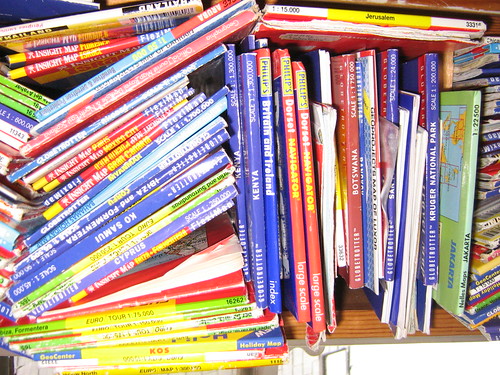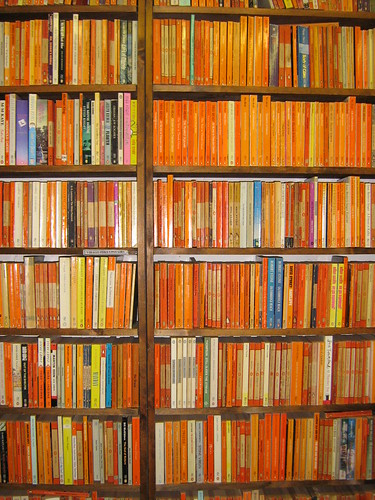
Don't you just want to reach out and touch these? Is there a single book there that wouldn't be worth looking at? And how does anyone ever make it all the way through a secondhand bookshop, anyway?
I've just spent three days in Hay-on-Wye, a tiny town on the England-Wales border that's best known now for its annual festival of literature and the arts. We made it to two and a half days' worth of the festival, but we (meaning, here, me and assorted family) were mostly there for the books. Hay-on-Wye is also the secondhand bookshop capital of, well, everywhere.
Every other shop sells books: £1 ex-library paperbacks, four-figure collectors' items, obscure fiction, obscure non-fiction, 1930s pulp fiction and leatherbound books called Ants and their Ways. There are over thirty bookshops in a town centre you can walk across in ten minutes. And while the booksellers are incredibly professional, and large secondhand bookshops really do need (and have) library-style organisation by increasingly detailed subdivision of subject area, there are only so many things you can do to impose order on chaos.
The festival itself is held out of town these days, but about ten minutes' walk away from the town centre. Still, ten minutes is a long, long way when it's as cold and wet and rainy as it was at the weekend. There's a constant stream of people walking between town and festival in both directions, and when there's only one narrow pavement and everybody's fighting with umbrellas and trying not to get even more mud on their feet (about which, I'd like to apologise to Nobel prizewinning poet Wole Soyinka for nearly jabbing him in the throat with an umbrella spoke. Well dodged, Mr. Soyinka). With all the events being held in giant marquee tents, it even got difficult to hear the speaker over the rattling, rippling sounds of walls and roofs in the wind sometimes (speak up, Professor Schama), but my God was it worth it. A. A. Gill's impersonation of a golf ball alone made up for the ticket prices. And between events, books.
I bought more than I can afford and fewer than I wanted, which is about right. Among acquisitions is the Ruskin book from a previous post, a seemingly brand-new copy of this for about 1/18th of the Amazon price, five George Pelecanos novels and a 1953 edition of Tess of the D'Urbervilles with photo illustrations. (According to the preface, '[a]ll but one of these photographs are reproduced by kind permission of Mr. Clive Holland who took them when, with Thomas Hardy, he visited the places described in the novel, shortly after its publication. They therefore present the Wessex scene as Hardy himself saw it. The actual place-names are given in italics.')
Not enough, of course. But you could spend Paris Hilton's inheritance in Hay, and you still wouldn't have bought enough books.
(From John Ruskin's 1872 preface to the later editions of Sesame and Lilies.)
[L]ife being very short, and the quiet hours of it few, we ought to waste none of them in reading valueless books; and [...] valuable books should, in a civilized country, be within the reach of every one, printed in excellent form, for a just price; but not in any vile, vulgar, or by reason of smallness of type, physically injurious form, at a vile price. For we none of us need many books, and those which we need ought to be clearly printed, on the best paper, and strongly bound. And though we are, indeed, now, a wretched and poverty-struck nation, and hardly able to keep soul and body together, still, as no person in decent circumstances would put on his table confessedly bad wine, or bad meat, without being ashamed, so he need not have on his shelves ill-printed or loosely and wretchedly-stitched books; for though few can be rich, yet every man who exerts himself may, I think, still provide, for himself and his family, good shoes, good gloves, strong harness for his cart or carriage horses, and stout leather binding for his books.I have a copy of one of these later editions, printed in 1908. It's showing its age a little: the white ink has nearly rubbed off the lilies stamped on the front cover, and there's tiny burn-marks dotted across the spine. Two previous owners have inscribed their names inside, and the author of the second (dated 17.2.1949) has meticulously crossed out the first (Wed., Sept. 27th, 1911). But for £4 from a secondhand bookshop, it's in good enough condition that it'll last another hundred years.
My Masters student baby brother is getting published before I am. My Masters student baby brother.
It's different in the Sciences. It's different in the Sciences. It's different in the Sciences...
I'm selling some of my books on Amazon. It feels like kicking fledglings out of the nest, although there's no reason it should do when most of these are books I haven't read for years. Some of them, I've never read at all; Sheri S. Tepper's Beauty has been sitting on a shelf for the past eleven years, but I've never got past the first few chapters. Giving it away feels like surrender.
That's the strange thing about giving away books, too: it's not just the books I like that I hate parting with. Listing the first thirty or so on Amazon, I found myself coming up with all sorts of reasons for why I absolutely had to keep something I hadn't read since I was fourteen and didn't ever really want to read again. Stephen Lawhead's Merlin hasn't been opened in years, but that didn't stop the voice of a book-hoarding demon whispering into my ear when I picked it up this morning. "Are you sure it should go? Don't you remember reading it in that holiday in the Pyrenees? The clouds? The flowers? The summer snow? And you loved all those King Arthur stories so much? But fine, if that means nothing to you, just you go ahead and sell all your memories and your fourteen-year-old self on Amazon for £1.25..." The voice in my other ear keeps whispering about overdrafts and bookshelf space, but that's just nowhere near as romantic.
Overheard on the bus back from campus this evening.
Student A: "...so I told my mother, and she went mad."
Student B, laughing: "Well, you really fucked it up."
Student A: "She knows... Yeah. She knows my grades are all right. My other grades. So I said I just, I don't know what happened that class, but it's - I said it's my fault, anyway. So she knows."
Student B: "So is she going to do it?"
Student A: "She went mad at me for about half an hour -"
Student B, interrupting: "You should just have said your grandmother died or something."
Student A: "No, right, because my flatmate says if you do that they ask for a death certificate."
[Student B nods sagely.]
Student A: "So she says, anyway, she says she'll write them a letter saying I'm telling the truth, but she won't do it again. 'Cause otherwise I have to repeat the whole year or something."
Student B: "She's telling them -"
Student A: "Yeah, family emergency, something. If they still don't believe me it goes to the Academic Council."
Student B: "Oh, yeah, they will. Right, I missed the exam in first year, and I told my tutor I had a drink problem - I went to his office all shaking and everything and said I had a drink problem, I hadn't drunk at home."
Student A, laughing: "Did he believe you?"
Student B: "Yeah! He gave me the number of the counselling people and everything, he was dead nice about it. He said I could always go and talk to him."
Student A, still laughing: "Aw, that is -"
Student B: "I was shaking and everything. Milking it, right?"
Student A: "Right."
Ai.
Amy at Textual Tangents sent me a link to this: library fundraising via Victorian porn. As a Victorianist and a library employee (though sadly not a librarian: they're the ones with useful Masters degrees and somewhere-close-to-decent salaries), I'm impressed. Why didn't we think of this?
On the other hand, if my employers were as budget-conscious as they claim to be, they'd have already tapped the huge market among our patrons for other services. Some kind of personal shopper service for those students who skipped library induction? ("Yes, I'm afraid all our books are shelved according to an esoteric code we're forbidden to disclose to the uninitiated. I'll just consult the gods of Class-Mark, and we'll be right with you.") Direct phone calls to the semi-mythical other librarian at the patron's last library, who always used to fetch my books for me, you know, because I'm useless with all these numbers and I just couldn't find them myself and she was so helpful, and on, and on... (It's always tempting to burst into tears when people try this one: "Well, if you loved her so much, what did you ever see in me?") Personal conscience for the weasel-minded Management and Law students, who are always hiding books in other corners of the library? (There's a John Grisham thriller in this. "He was a brilliant young law student who never looked back, until the day he finally learned: when you stare into the abyss behind the Fine Arts and Architecture shelves, the abyss behind the Fine Arts and Architecture shelves stares back into you.")
Both the departments I work for (the library counts as a non-academic department) are in the middle of major overhauls at the moment. The restructure of the English curriculum has taken a lot of work and about 570,000 hours of staff time in committee meetings to get into place, but it's mostly existed off the student radar, so even though the point of the revisions is to change things in a fundamental way for the students, the students themselves won't see it as a huge interruption to their studies. The library renovations, on the other hand, are going to affect everybody, even though the explicit aim is to cause as little disruption to students as possible. We'll be shifting to a mostly closed-stacks system for a year, which is annoying but unavoidable, and every single book we own will have to be moved somewhere else. (I look forward to finding all those missing law textbooks when the builders prise up the floorboards, though.) Since we foolishly neglected to set up a Victorian sex phoneline, the budget is limited, but we seem to have an infinite supply of money for Artists' Impressions of what the renovated library will look like.
Actually, you know what the Vienna library should spend their phoneline income on? Artists' impressions of what the library will look like during the renovations. I think we'd all be better prepared if we knew what was coming in the immediate, as well as the distant, future. "And behind that pile of rubble, the student in the green shirt is windmilling his arms about in fury because it'll take four hours to get the book he needs right now, I tell you! Now! God, the librarian at his last library would never have done this..."
Tony Blair wants 50% of young people in higher education by 2010. There is discontent.
The longer version of that is more nuanced, both in the situation itself and in the political side-stepping involved in defining it. Specifying 'higher education' rather than 'university' allows for more wiggle room in terms of vocational and semi-vocational courses, many of which aren't university degrees in themselves. 'Young people' are the under-30s rather than just the school-leavers, so someone in full- or part-time work whose employer was willing to fund them through a relevant short vocational course would count alongside the 18-year-old going to Cambridge. Defined this way, we already have over 40% participation in higher education today.
The discontent is coming from several directions. Institutions grumble, justifiably, over not having the resources to give all these new students a place. The population as a whole grumbles because university education is getting more expensive at the same time as getting more important for the job market. And university staff grumble because God, we'll have to teach these kids, don't we have enough apathetic semi-literate slackers who don't belong at university already?
(Okay, we don't phrase it quite like that. But the sentiment's there.)
I'm split on this issue. On one hand, I don't like teaching apathetic semi-literate slackers much, and it's difficult to argue that increasing the number of under-30s in higher education won't bring in more students who wouldn't have been seen academically as university material in previous generations. On the other hand, I don't think those two things are necessarily related. At the very least, they're not cause-and-effect; 'students who aren't academically excellent' and 'students who don't want to be in the room' are separate, if overlapping, groups.
To give one example, I have a lot of students who can't use commas. I can grumble about it not being my job to teach them this, and, well, in an ideal world it's not, but in this world they and their misplaced commas are in my class. Now, inadequate comma use isn't a sign of low inherent ability: nobody's born knowing how to use a comma, and they can learn now if they weren't taught in primary school. The problem isn't with students who can't use commas, but with students who can't use commas and don't want to learn how. There are ways of teaching punctuation to people who don't know the rules, but how on earth are you supposed to teach it effectively to people who don't care?
So far, growing participation in higher education hasn't come from us getting more bright kids from across the social class spectrum, but with us getting more kids from better-off families. University is becoming something you do - something you're expected to do - when you leave school. The don't-care students aren't here because they want to study one subject in particular depth, but because they want the bit of paper with a degree printed on it. As degrees become more universal, it's the absence of a degree that'll make you stand out (and not in a good way) in various parts of the job market. My don't-care students see the education itself as a necessary evil.
As for the issue of inherent academic ability: well, I'd rather teach a class of students who had no idea what a comma was but always did the reading and always had something to say in discussions, than a class of students who could do the work standing on their heads but who sulk all through the course. Give me the don't-knows over the don't-cares any day.
There's a wider issue here about university and the class system overall, too. You, as a hypothetical eighteen-year-old student of professional parents, are currently about five times more likely to go to university than you would if your parents were unskilled workers. That's not hereditary intelligence there; that's something else. A university degree doesn't just mean you have the brainpower to cope with higher education.
Getting more young people into higher education doesn't necessarily mean we'll end up with more don't-cares than don't-knows, but changing our cultural expectations of university to mean 'that place you go to when you're eighteen if you're one of our sort of people' does. And if there's one group of students who shouldn't be at university, it's the ones who don't want to be here.
(Punch, Dec. 21, 1875)
There is a Book announced under the title of Animals Painted by Themselves.On (Roualeyn) Gordon Cumming, and why lions would deny ever having met him, see his mid-century Harper's articles on man-eating lions.
The Fox is the only animal we know of who possesses a brush, but whether he can paint with it we have yet to learn. But this is, of course only our little joke, which we must have: we know perfectly well that the title may be taken figuratively. The headings of the chapters no doubt will be more or less (more, perhaps) as follows:-
The Lion. - King of the Beasts - Much recieved in Society - Adored by the Ladies - Never met Gordon Cumming - Paws soft and effeminate - Naturally mild and philanthropic.
The Bear. - Elegant Action of - Agreeable Manners - Charming Tenor Voice - Fond of Waltzing - At the Head of the Pole - Has a Hug for every Friend.
The Fox. - Naturally frank and open - Would not hurt a Chicken for Worlds - Always liked Sour Grapes - The Best Friend with Hounds.
The Pig. - The Victim of Slander - His Clean Habits - His Sweet Home - His Abstemiousness and Remarkable Temperance - His Plaintive Warble, and his Love of Hebrew.
The Ass. - His Musical Talents - His Tender Lips - Activity in Bondage - Willing Acquiescence when Asked to Gallop.
The Monkey. - Greek Type Developed - Superiority to Man - Dramatic Powers. &c., c., c.
The Work promises to be most amusing, if not instructive. We only hope it will be illustrated by Animals. Why not? Badgers have been most successfully drawn by Dogs; and few Horses but have drawn a carte de viste. So we repeat, Why not?
- Packet of blackcurrant-flavoured Lockets
- Two undergrad theory textbooks
- Pair of glasses
- 1960s science fiction anthology edited by Ray Bradbury
- The kitchen floor
- The hall carpet
- Book on poverty and welfare reform laws
- Arms, legs, ears, head of toy rhino
- Pair of prescription sunglasses
- The cushion she sleeps on
- The blanket she slept on before that
- The skirting boards in the hall
- Assorted letters, envelopes, pieces of junk mail
- Single slipper
One day we're going to come home to the little, gnawed stump of a house, the dog lying next to it with her best mournful A Big Dog Did It And Ran Away expression.